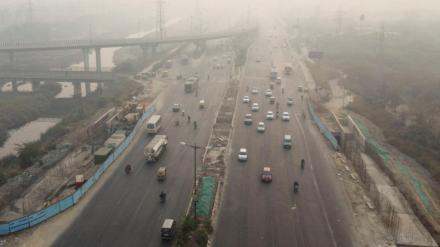The Centre’s air quality panel for Delhi-NCR imposed the strictest Stage 4 restrictions under the Graded Response Action Plan (GRAP) on Monday night, as the region’s air quality deteriorated to the ‘severe’ category. These curbs include a blanket ban on all construction activities and the entry of polluting trucks, amid mounting concerns over worsening pollution levels and adverse weather conditions.
Delhi’s 24-hour average Air Quality Index (AQI) soared to 379 by 4 pm but breached the critical 400 mark late in the evening due to extremely calm wind conditions and the formation of an inversion layer. The inversion layer restricts the upward dispersion of pollutants, exacerbating the already poor air quality.
The Commission for Air Quality Management (CAQM) announced the decision to implement Stage 4 restrictions just hours after imposing Stage 3 measures earlier in the day when the AQI crossed 350. The rapid deterioration prompted authorities to take stricter action to curb emissions and pollution.
Under Stage 4 of GRAP, all construction and demolition activities, including public infrastructure projects like highways, flyovers, power lines, and pipelines, are prohibited. Non-essential diesel trucks carrying goods are barred from entering Delhi.
To protect public health, the CAQM has made significant adjustments to schooling. Classes for grades 6th to 9th and 11th in Delhi-NCR must operate in hybrid mode — offering both online and offline options. Classes up to grade 5th had already been shifted to hybrid mode under Stage 3 restrictions.
Public, private and municipal offices are mandated to operate with only 50% of their staff on-site, with the remaining staff working from home. The state governments have been advised to explore additional measures, such as the closure of non-essential businesses, colleges and the implementation of odd-even vehicle restrictions to reduce traffic emissions.
Stage 3 restrictions, which were implemented earlier in the day, prohibit the use of BS-III petrol and BS-IV diesel cars in Delhi-NCR. Non-essential diesel-operated medium goods vehicles that fail to meet the BS-IV standard are also banned. Exceptions have been made for persons with disabilities.
The state and Centre have been urged to stagger office hours for public and municipal offices to minimise vehicular congestion and further reduce emissions.
Doctors warn that prolonged exposure to Delhi’s hazardous air can have severe health implications. Experts equate breathing the current air to smoking approximately 10 cigarettes daily. “Prolonged exposure can exacerbate respiratory issues like asthma, bronchitis, and COPD while significantly increasing cardiovascular risks,” a pulmonologist emphasised.
Delhi’s annual winter pollution crisis arises from a combination of meteorological conditions, vehicular emissions, paddy-straw burning in neighboring states, and localized sources like firecrackers and industrial activity. GRAP was introduced to manage pollution in a phased manner, with Stage IV restrictions activated when the AQI exceeds 450—categorising air quality as “Severe Plus”.
The CAQM had earlier relaxed GRAP 4 curbs in December after a brief improvement in air quality, but the current spike has once again necessitated emergency measures.
